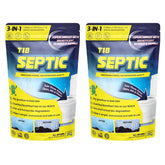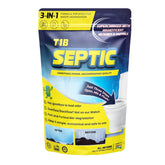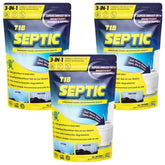Can Septic Tank Overflow Harm Your Garden or Plants?
Your garden is thriving, your plants are lush—and then suddenly, you notice foul odors, soggy soil, and patches of dying vegetation near your septic tank. What went wrong?
If you've ever wondered whether septic tank overflow can harm your garden, the short answer is: Yes, it can—and in more ways than you think.
In this blog, we’ll explore the risks, signs of trouble, and how to protect your green space with natural microbial solutions like T1B Septic.
Understanding What’s in Your Septic Tank
A septic tank contains human waste, detergents, organic solids, grease, and harmful bacteria. When the tank is working properly, bacteria break down waste and safely discharge the liquid into the soak pit or drain field.
But when the system overflows?
You're not dealing with compost. You're dealing with untreated sewage that can damage plant life and pose serious health hazards.
How Septic Tank Overflow Affects Your Garden and Soil
Here’s how overflow can impact your green spaces:
1. Root Rot and Plant Death
Sewage water is rich in pathogens and low in oxygen. Prolonged exposure to such effluent suffocates plant roots, leading to rot and decay.
2. Soil Contamination
Overflowing waste introduces harmful microbes, viruses, and heavy metals into the soil, making it toxic for both plants and people over time.
3. Lawn Discoloration or Patchy Grass
A common sign of septic issues is lush, fast-growing grass in one area or yellowing/dead patches nearby. Both are signs of nutrient imbalance due to overflow.
4. Foul Odors and Mosquito Breeding
Stagnant wastewater creates a smelly, mosquito-infested mess—hardly ideal for your backyard.
5. Contaminated Home-Grown Fruits & Veggies
If your kitchen garden is near the septic drain field, the pathogens can enter your food chain, making it unsafe to consume.
What Causes Septic Overflow?
- Delayed septic cleaning
- Using harsh chemical cleaners that kill good bacteria
- Soak pit clogging
- Excessive water usage
- Poor microbial balance in the tank
How to Prevent Septic Overflow (The Natural Way)
One of the most effective ways to prevent overflow is by introducing natural bacteria into your septic system regularly.
T1B Septic is a microbial powder that:
- Degrades sewage waste efficiently
- Restores microbial balance
- Unclogs soak pits
- Prevents foul odor and overflow
- Reduces the need for frequent mechanical pumping
With monthly dosing, T1B Septic keeps your system healthy—and your garden safe.
Eco-Tip: Septic Maintenance = Garden Protection
Your garden’s health starts underground. When your septic tank is working well, your plants thrive naturally. But if ignored, it can become a source of contamination and irreversible damage.
Final Thoughts
So, can septic tank overflow harm your garden or plants?
Absolutely. But with proper care, regular microbial treatment, and early warning signs, you can protect both your septic system and your green oasis.
Take Action Today
Prevent overflow before it starts.
✅ Try T1B Septic – The natural microbial solution for clean, odor-free, and safe septic systems.






Leave a comment
Please note, comments need to be approved before they are published.